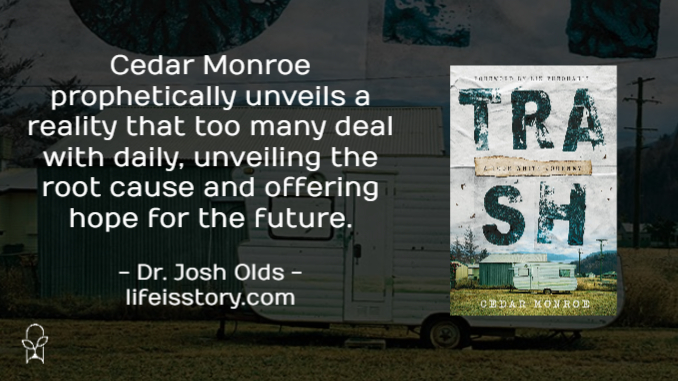
Published by Broadleaf Books on March 5, 2024
Genres: Non-Fiction, Memoir, Social Justice
Buy on Amazon
Goodreads

Human beings are not trash, and the system that enables humans to imagine each other as such needs to end.
Every day across the US, 66 million poor white people pay the price for failing whiteness. In this sweeping debut, activist and chaplain Cedar Monroe writes indelibly about and for poor white people: about unlearning the American dream, untangling from white supremacy, and working for liberation alongside other poor folks.
Monroe introduces us to people who are poor and unhoused in a small town in Washington, who eke out a living on land that once provided timber for the nation. On the banks of the Chehalis River, we meet residents of the largest homeless encampment in the country, who face sweeps and evictions and are targeted by vigilantes before bringing their case to federal court. We watch a community grapple with desperation, government neglect, and its own racism. From visits to jails, flophouses, tent cities, and on trips to hospitals and funeral homes, we see leaders forging connections between their people and the global movement to end poverty.
With trenchant insight born of liberation theology, radical politics, and an even more radical hope, Monroe introduces us to people hammering out survival strategies and hope in the abandoned zones of empire. Capitalism and colonialism have stolen land from Indigenous people, forced workers into dangerous jobs, and then left them to die when their labor was no longer needed. But what would happen if poor white folks rejected the empty promises of white supremacy and embraced solidarity with other poor people? What if they joined the resistance to the system that is, slowly or quickly, killing us all? Trash asks us to see anew the peril in which poor white people live and the choices we all must make.
They say we are trash people. White trash. That’s the opening to Cedar Monroe’s memoir/study of how white supremacy and capitalism has harmed poor white rural America—all while convincing them it is their savior. Monroe makes the case that when it comes to studies on and empathy for those in poverty, those considered “white trash” are often overlooked. They write that when they began to study white, rural poverty and its causes, they experienced opposition from both sides—both the conservative white religious groups they’d grown up in and within the liberal academia they were now part of. Trash: A Poor White Journey offers a compassionate understanding of poor whites, details how they came to be in that position, why they believe what they believe, and how they can move forward.
The most powerful part of Trash is the way Monroe frames the conversation. Because of their background, they are able to offer thoughtful and nuanced perspectives on the plight of poor whites. One of the most common stereotypes about this group is that they are uneducated, racist, and vote against their own interests. And stereotypes are generally created because they have a basis in reality. Monroe suggests that impoverished whites have “failed” white supremacy and, having done so, aren’t seen as worthy of redemption or help. Poor whites then, having been given this false birthright of supremacy, grasp for what distinctions they have. This leads to racist thinking against minorities and blaming minorities for attempting to usurp their supremacy.
Monroe writes how all this plays out in the life of her family and those surrounding her throughout her childhood. They tear down some of the liberal myths of white poverty and correctly aim the problem not at minorities but the systems of empire that require vast amounts of people to remain impoverished. Trash is beautifully-written, incisive, and cutting. Readers are taken from homeless camps in DC to the hills of Appalachia to the drug-ridden towns of the Midwest to the Pacific Northwest and more. Trash doesn’t just give facts and suggest policy, it tells stories.
And let me tell, these stories are how we gather the empathy, desire, and knowledge to demand change. Facts and figures won’t do it. White paper and policy suggestions won’t change a thing. What we need is to be confronted with the humanness of the poor, to understand their grit, their desperation, their work ethic, their hopelessness, in all of its nuance and complexity. This is where Trash excels. Cedar Monroe prophetically unveils to us the reality that so many live with. And just as importantly, for those living within that reality, they unveil the real root cause and offer hope for the future.
The epilogue of the book offers a stirring and powerful call to action: “We have to find strength in the stories and resistance and faith of our ancestors. We have to rediscover our oldest stories, our deepest strength…We are not trash, like we have been told. The systems that kill us are trash…We can rise.” That powerful message of hope is a lifeline in a dying world.
